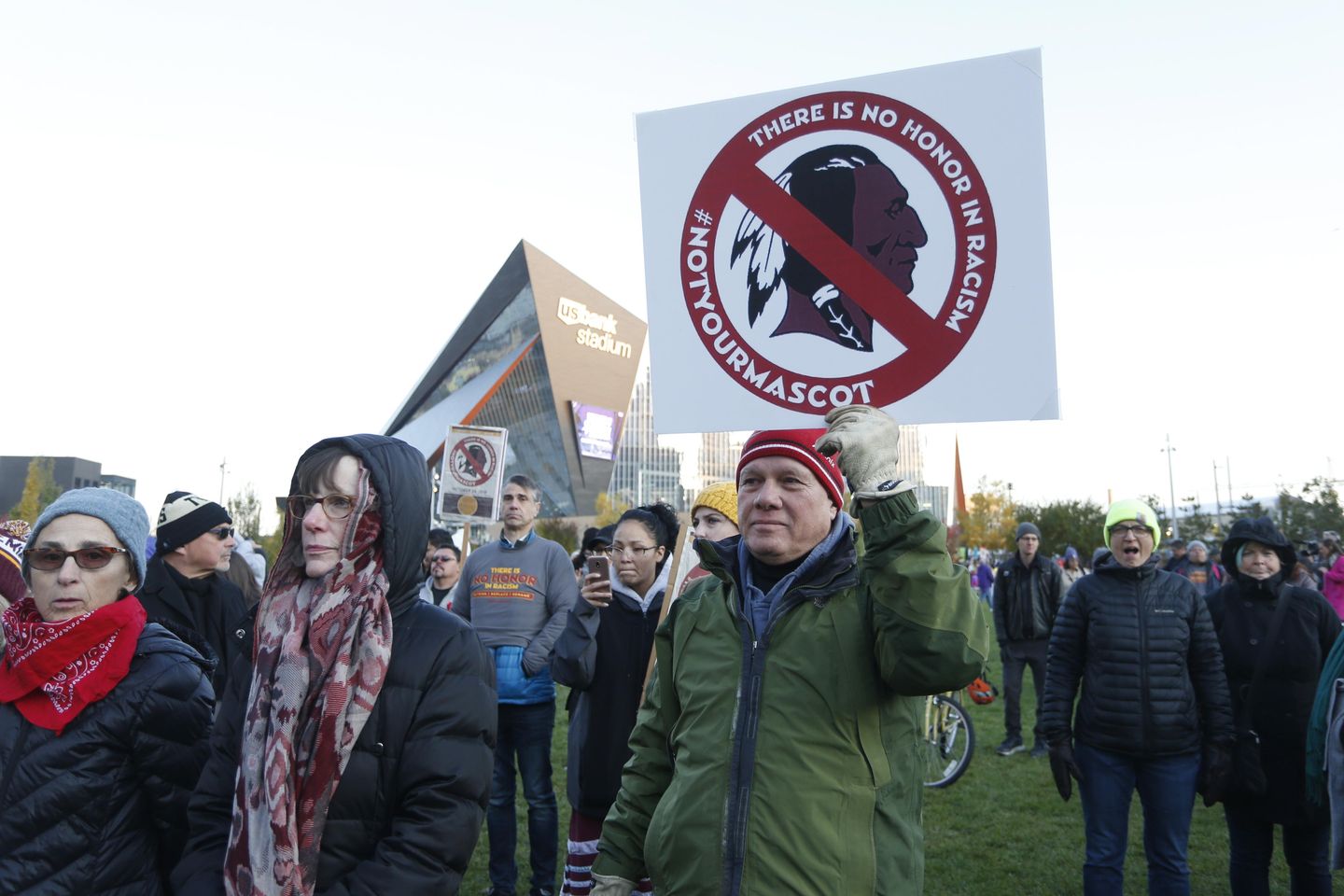
President Donald Trump is threatening to hold up a new stadium deal if Washington’s NFL team does not restore its name to a racial slur, despite decades of psychological research showing the negative mental health impacts of Native American mascots.
The president is demanding a private company change its name to something that researchers have linked to a variety of negative mental health outcomes, particularly for children, said Mark Macarro, president of the National Congress of American Indians. The organization has been pushing back on stereotypes of Native Americans since the 1950s, including Native sports mascots.
“This is a big reminder with this administration that we’re going to take some backward steps,” Macarro said. “We have our studies, we have our receipts, and we can demonstrate that this causes real harm.”
More than two decades of research on Native mascots have shown they lead to heightened rates of depression, self-harm, substance abuse and suicidal ideation among Indigenous peoples, and those impacts are the greatest on children. Citing this data, the American Psychological Association has been recommending the retirement of Native mascots since 2001.
The president believes that franchises that changed their names to “pander to the Woke Left” should immediately restore their original names,” White House spokesperson Davis Ingle said in a statement to The Associated Press.
“Thanks to President Trump, the days of political correctness and cancel culture are over,” he said.
Under pressure from decades of activism, the Washington Redskins – a racial slur and arguably the most egregious example – retired the name in 2020, eventually settling on the Commanders. Later that year, the Cleveland Indians changed their name to the Guardians.
Two major league teams, the NFL’s Kansas City Chiefs and the NHL’s Chicago Blackhawks, continue to resist calls to change their names. The Chiefs have banned fans from wearing headdresses or face paint meant to depict Native Americans at games, but have resisted prohibiting the use of the “tomahawk chop”, which critics have long called derogatory.
More than 1,500 grade schools across the country – a decrease over the past few years – still use Native mascots, according to the National Congress of American Indians, using names like “Savages” as well as the slur that Trump aims to bring back to the Washington team.
Native American people, activists, and leaders have been asking for the retirement of Native mascots for generations. Popular arguments defending the mascots have been that they “honor” Native people or that it simply boils down to people being “offended,” said Steph Cross, a professor of psychology and researcher at the University of Oklahoma and a citizen of the Comanche Nation. But now we have decades of data that agree on the negative mental health impacts, she said.
“Being offended is not even really the problem. That’s a symptom,” Cross said.
She noted that Native mascots aren’t just harmful to Indigenous peoples; they also reinforce racial prejudices among non-Natives, including people who will work directly with Native people, like health care professionals and teachers.
“I think about these people who are going to be working with Native children, whether they realize that or not, and how they may unintentionally have these biases,” Cross said.
Stephanie Fryberg, a professor at Northwestern University, who is a member of the Tulalip Tribes and one of the country’s leading researchers on Native mascots, said, “The ultimate impact, whether conscious or unconscious, is bias in American society.”
Her work has also shown that Native mascots increase the risk of real psychological harm, especially for young Native people.
“Honoring Native peoples means ending dehumanization in both imagery and policy,” she said. “Indian Country needs meaningful investment, respect, and the restoration of federal commitments, not more distractions or excuses for inaction.”
In recent years, several states – including Maine, Oregon, Washington, Colorado, and New York – have passed laws or issued directives that ban or require districts to change Native mascots. A law prohibiting them in Illinois stalled this year in the state Senate.
The Trump administration has interjected into other efforts to change Native mascots. This month, the U.S. Department of Education launched an investigation into a Long Island public school district working to retire its Native American-themed mascot.
“The Department of Education has been clear with the state of New York: it is neither legal nor right to prohibit Native American mascots and logos while celebrating European and other cultural imagery in schools,” said U.S. Secretary of Education Linda McMahon.
When it comes to grade schools specifically, the negative impacts on children’s mental health is compounded by the fact that U.S. history standards largely ignore Indigenous history and rarely frame Native Americans as modern people, said Sarah Shear, a professor and researcher at the University of Washington.
In 2015, she was part of a study that found 87% of schools in the U.S. teach about Native Americans in only a pre-1900 context. That hasn’t improved much in the decade since the study, Shear said. Most curricula also don’t present the arguments against harmful stereotypes, like Native Mascots.
“Just on the standards documents alone,” Shear said, “I’m not surprised that Trump and other folks continue to advocate that these mascots are celebratory when they’re not.”










